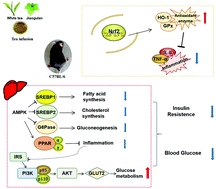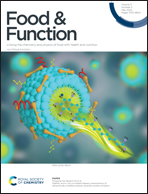Jiaogulan tea (Gpostemma pentaphyllum) potentiates the antidiabetic effect of white tea via the AMPK and PI3K pathways in C57BL/6 mice†
Abstract
The use of plant-based beverages to interfere with the onset of diabetes may be a promising approach towards type 2 diabetes mellitus (T2DM). The present study investigated the antidiabetic effects of the oral consumption of white tea and G. pentaphyllum (Jiaogulan), especially their combination on HFD/STZ-induced T2DM in C57BL/6 mice. White tea and Jiaogulan administration could mitigate glycolipid metabolic disorders in the diabetic mice by different degrees. White tea administration markedly reduced the blood glucose and ameliorated the glucose intolerance compared to the T2DM mice. Moreover, white tea consumption could protect the islet β-cells against oxidative and inflammatory damage, related to the Nrf-2 signaling pathway. Jiaogulan prominently attenuated liver lipid accumulation by downregulation of SREBP levels. However, interestingly, when white tea was used in combination with Jiaogulan, these effects were enhanced to a certain extent. In particular, the combination significantly suppressed the hepatic G6Pase expressions by activating the AMPK pathway, thus inhibiting gluconeogenesis and improving insulin resistance. On the other hand, the combined formula could regulate the PPAR expressions and ameliorate the hepatic inflammation, further activating the IRS/PI3K/AKT pathway and exerting the antidiabetic potential. Therefore, it was speculated that the antidiabetic effect of this combination may be associated with the AMPK/PI3K pathways. Our findings might provide insight into the combined use of white tea with Jiaogulan tea as a potential functional beverage or food for preventing T2DM.



 Please wait while we load your content...
Please wait while we load your content...